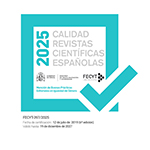The processing of morphology in children with and without reading disabilities
Resumen
En este trabajo presentamos los resultados de un experimento diseñado para estudiar la influencia del procesamiento morfológico en el reconocimiento léxico de palabras complejas por parte de niños con y sin patología lectora. ¿Utilizan los niños los constituyentes morfológicos de las palabras para comprenderlas?, ¿cómo se ve influido este proceso por las capacidades lectoras de los niños? Para llevar a cabo el estudio se manipula la variable de Frecuencia de Base y se realiza una tarea de definción de pseudopalabras. Los resultados muestran que los niños con dificultades lectoras, incluso en una tarea en las que no existe límite de tiempo para su realización, tienen menor rendimiento que sus compañeros sin dificultades. Estos resultados parecen indicar que las dificultades que diferencian a jóvenes lectores con y sin dificultades no se ciñen exclusivamente a la etapa de acceso al léxico, sino que también el procesamiento léxico y semántico podrían verse alterados.Descargas
Descarga artículo
Licencia
La Revista de Investigación en Logopedia, para fomentar el intercambio global del conocimiento, facilita el acceso sin restricciones a sus contenidos desde el momento de su publicación en la presente edición electrónica, y por eso es una revista de acceso abierto. Los originales publicados en esta revista son propiedad de la Universidad Complutense de Madrid y es obligatorio citar su procedencia en cualquier reproducción total o parcial. Todos los contenidos se distribuyen bajo una licencia de uso y distribución Creative Commons Reconocimiento 4.0 (CC BY 4.0). Esta circunstancia ha de hacerse constar expresamente de esta forma cuando sea necesario. Puede consultar la versión informativa y el texto legal de la licencia.












